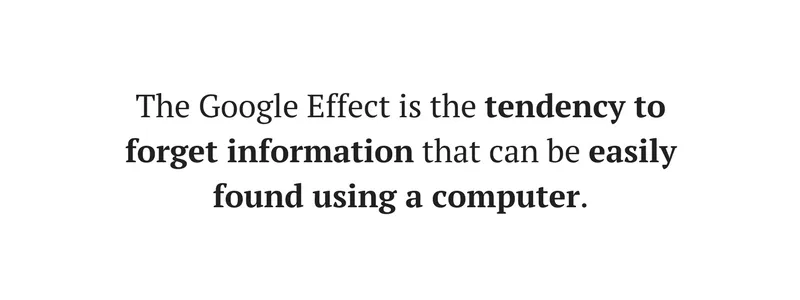
You're working on a piece of software but keep getting the same error, so you type the error message into Google.
The first hit is from StackOverflow.com, which you click, and to your joy discover that it solves your problem.
Two hours of hard coding later, the same error appears; however, you can't remember what the solution was anymore, so you type the error message into Google again.
Congratulations! You've fallen victim to the Google effect.

Story 1
The phenomenon extends beyond general knowledge such as the capital cities of various countries, which is why the Google Effect is more generally referred to as digital amnesia.
In 2015 Kaspersky Lab surveyed 1000 consumers ranged from 16 to 55+ in the United States and found that:
The results reveal that the 'Google Effect' likely extends beyond online facts to include important personal information.
They found that in most cases, people could not remember important information such as telephone numbers that should have been familiar. This led to the conclusion that the information was forgotten because of the ease of finding it using devices.
What can we do about it?
As we become ever more interconnected with our devices and the Internet at large, we shift our focus from knowing information to knowing how to find information. And this isn't intrinsically bad. In some ways it's similar to asking a friend or colleague for the information.
However, breaking our reliance on machines can help develop our memory, making it easier for us to use the information in our every day lives.
Banner photo by SEO used under the CC-BY-2.0 license. Changes were made to the original.
Other posts in the series:
- The lies we tell ourselves - the bystander effect
- The lies we tell ourselves - the just-world fallacy
- The lies we tell ourselves - the cheerleader effect
- The lies we tell ourselves - the hindsight bias
- The lies we tell ourselves - authority bias
- The lies we tell ourselves - the halo effect
- The lies we tell ourselves - the gambler's fallacy
- The lies we tell ourselves - the sunk cost fallacy
- The lies we tell ourselves - the framing effect
- The lies we tell ourselves - cognitive dissonance
- The lies we tell ourselves - confirmation bias